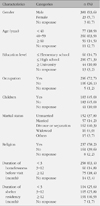Abstract
Purpose
The purposes of this study were to examine the level of anger, anger expression, depression, psychosomatic symptom and perceived health status, and to identify the influencing factors of anger expression in shelter residents.
Methods
This study employed a descriptive correlational design. Data were collected from 407 homeless people residing at 27 shelters using structured instruments.
Results
The level of anger expression was different by age, educational level, existence of children, and duration of shelter residency. Anger expression was significantly correlated with depression, psychosomatic symptoms and perceived health status. The predictors of high-level anger expression was younger age, low educational level, duration of shelter residency in Model 1 (F=6.884, p<.001, Adj. R2=.065), and depression and psychosomatic symptoms in Model 2 (F=7.197, p<.001, Adj. R2=.113).
References
2. Association of Physicians for Humanism. A survey of health status of homeless. Seoul: Association of Physicians for Humanism;1998.
3. Boergers J, Spirito A, Donaldson D. Reasons for adolescent suicide attempts: Associations with psychological functioning. J Am Acad Child Adolesc Psychiatry. 1998; 37(12):1287–1293.

4. Cho DH. Psychological status of homeless in the shelter. Busan: Busan National University;2001. Unpublished master's thesis.
5. Cho HJ, Jun TY, Chae JH, Woo YS, Choi JE, Kee BS, et al. The relationship of heterogenous symptoms of depression and emotional regulation strategies in depressive disorder. Korean J Clin Psychol. 2007; 26(3):663–679.
6. Choi SI, Kim JS, Shin MS, Jo MJ. Modes of anger expression in relation to depression and somatization. J Korean Neuropsychiatr Assoc. 2001; 40(3):425–433.
7. Chon KK, Hahn DW, Lee CH, Spielberg CD. Korean adaptation of the state-trait anger expression inventory: Anger and blood pressure. Korean J Health Psychol. 1997; 2(1):60–78.
8. Choi WL. A study on the homeless careers. Seoul: The Catholic University of Korea;2000. Unpublished master's thesis.
9. Council of Religion & Citizen's Movements for the Homeless. 2006. Retrieved December 1, 2006. from http://www.homeless.or.kr/zeroboard/zboard.php?id=new_data03.
10. Forgays DK, Spielberg CD, Ottaaway SA, Forgays SG. Factor structure of the state-trait anger expression inventory for middle-aged men and women. Assessment. 1998; 5(2):141–155.

11. Gilbert P, Gilbert J, Irons C. Life events, entrapments and arrested anger in depression. J Affect Disord. 2004; 79(1):149–160.

12. Hur JS. Homeless shelter residents' characteristics in relation to the duration of shelter residency, and major determinants of the duration of shelter residency. Korean J Soc Welf Stud. 2002; 19:227–256.
13. Hyun SW, Choi HK. An analysis of the roots of homeless. Korean Public Adm Q. 2008; 20(4):1153–1178.
14. Ju JY. The study on the relationship among anger expression mode, depression, and aggression in high school students. Seoul: Seoul Women's University;2005. Unpublished master s thesis.
15. Kim HS, Kim SY, Cho SM, Chung YK, Yang JJ, Shin YM. Mental health status and familial factors of runaway adolescents in shelter. J Korean Neuropsychiatr Assoc. 2005; 44(5):597–603.
16. Kim JH, Kim GI. Standardization study of Symptom Check List in Korea III. Ment Health Res. 1984; 2:278–311.
17. Kim KJ. Prediction model for health promotion behaviors in middle-aged men. Seoul: Hanyang University;2000. Unpublished doctoral dissertation.
18. Kim JH. Differences of psychological and mental characteristics between the homeless in the street and the shelter. Seoul: Chungang University;2002. Unpublished master's thesis.
19. Kim O, Kim AJ, Kim SH, Baik SH, Yang KM. Fatigue, depression and sleep in young adult and middle-aged. J Korean Acad Nurs. 2003; 33(5):618–624.

20. Lawton MP, Moss M, Fulcomer M, Kleban MH. A research and service-oriented multi-level assessment instrument. J Gerontol. 1982; 37(1):91–99.
21. Lee YH, Song JY. A study of the reliability and the validity of the BDI, SDS, and MMPI-D scales. Korean J Clin Psychol. 1991; 10(1):98–113.
22. Lee SA. A study on the effects of the related factors on the mental health of the homeless -Focused on the homeless in the shelter in Daejeon-. Daejeon: Chungnam National University;2002. Unpublished master's thesis.
23. National Coalition for the Homeless. Illegal to be homeless: The criminalization of homelessness in the United States 2002. USA: National Law Center on Homelessness and Poverty;2002.
24. Park SJ. A study of effect in the groupwork program for alcoholic homelessness. Busan: Silla University;2001. Unpublished master's thesis.
25. Park YJ, Baik S, Shin HJ, Yoon J, Chun SH, Moon S. Anger, cardiovascular health and depression in middle-aged Korean men: The mediating effect of social support. J Korean Acad Nurs. 2006; 36(5):863–871.
26. Park YJ, Ryu H, Han K, Kwon JH, Kim HK, Cho YJ, et al. Development and evaluation of a schoolbased anger management program (SAMP) for adolescents. J Korean Acad Nurs. 2009; 39(1):145–156.

27. Pica M, Engel SD, Welches P. An experimental approach to the inpatient anger management group. Int J Group Psychother. 2003; 53(2):177–200.
28. Suinn RM. The terrible twos-anger and anxiety: Hazardous to your health. Am Psychol. 2001; 56(1):27–36.

29. Yeo SJ. The health status of the homeless in sheltered. Busan: Pusan National University;2004. Unpublished master's thesis.
30. Won JS. The life experiences of the sheltered homeless. J Korean Acad Adult Nurs. 2003; 15(1):56–66.




 PDF
PDF ePub
ePub Citation
Citation Print
Print







 XML Download
XML Download